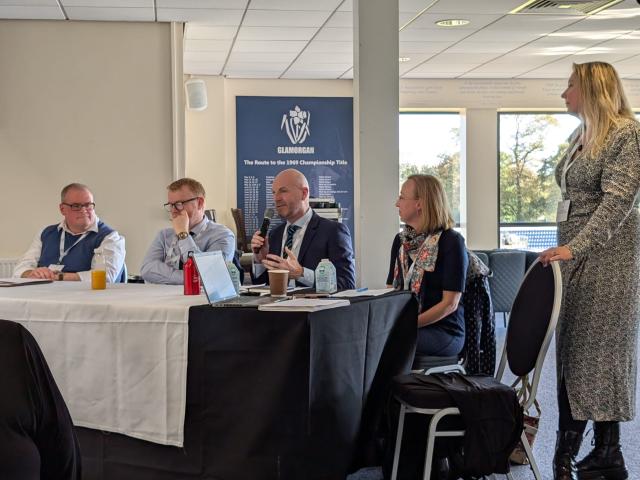
What are the grand challenges for adult social care research in Wales?
17 October
It’s widely known that improving social care services using evidence-based approaches and research is fundamental to enhancing quality of care. However, in this current climate of stretched budgets and workforce we explored the grand challenges for adult social care research in Wales at our ninth conference, themed Research Matters.
We heard from representatives from the social care sector in Wales, from academia to practice.
Social care sector in Wales
From limited time to lack of access and proper infrastructure, there were a few key themes which kept reoccurring from all four speakers Professor Paul Willis, Director of Centre for Adult Social Care Research (CARE), Alwyn Jones, Chief Officer for Social Care, Wrexham County Borough Council, Rachel Scourfield, Knowledge Mobilisation Manager at Social Care Wales, and Professor Mark Llewellyn, Director of the Welsh Institute for Health and Social Care, and Professor of Health and Care Policy at the University of South Wales.
CARE tackling grand challenges
Centre for Adult Social Care Research, funded by Health and Care Research Wales, has visions to help tackle some of these challenges by generating high quality evidence to be used in practice. Its director, Paul Willis, provided an overview of the relatively new centre and highlighted ongoing initiatives already in place.
He said: “One of our biggest challenges is achieving better engagement of underrepresented and marginalised groups. This should be a priority area for both social care and researchers to truly reflect the needs of all service users across Wales and the UK.”
Awareness of the impact of research
Alwyn, Chief Officer for Social Care, Wrexham County Borough Council, agreed with the need for a higher value on the knowledge and experience of practitioners and service users. He also looked at ways in which we can overcome some of these challenges through a data- focused infrastructure, an increased awareness of the impact of research into adult social care and embedding research in the social care culture to allow peer learning and support.
He said: “If we don’t value the importance of research now, we never will. Research can contribute to the future practices, to learn from what we have done in the past.”
Challenges to be an opportunity
From her 23 years’ experience as a social care practitioner now knowledge mobilisation manager at Social Care Wales, Rachel Scourfield, said: “In social care I feel passionately that these large challenges can be seen as being a fantastic opportunity to evolve in a meaningful manner.”
To get the best out of research we need to: support new ideas break barriers and unlock access.
“From my own practitioner experience and through the practitioners we are working with it is clear that social care staff are passionate about supporting citizens and if given some time and resources they can develop into robust practitioners who can be resilient when the pressure increases as they know that their practice and decision-making is evidence enriched.”
Reflected in the new strategy, Ymlaen and found through the Insightcollective.socialcare.wales
And finally, Professor Mark Llewellyn echoes the challenges of time, money and political landscape however ends on a positive note for the future.
“We have the strategic policy determined by Welsh Government and other national and regional bodies, the delivery and provision determined by largely local authorities and then the messy bit in the middle, where the social care workforce translates the national picture into on the ground support.”
Professor Mark Llewellyn, Director of the Welsh Institute for Health and Social Care, and Professor of Health and Care Policy at the University of South Wales, said:
The answers are sometimes as challenging as the questions.”
“But there’s hope and progress within the sector, see the NIHR funded Health Determinant Research Collaborations in Torfaen and Rhondda Cynon Taf County Councils, hopefully this is the start of truly embedding social care research into policy and practice.”